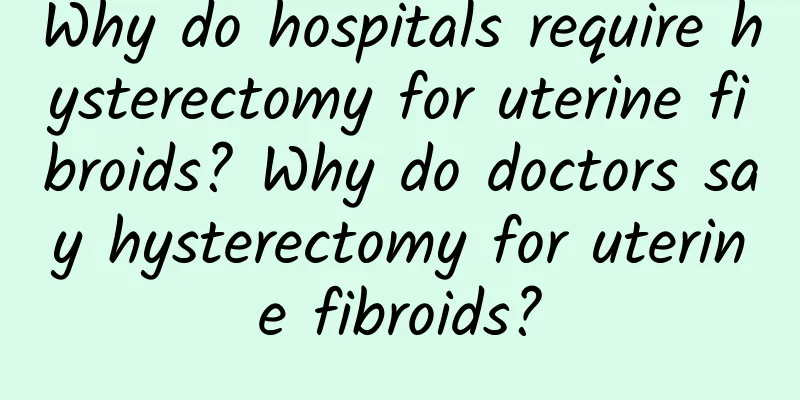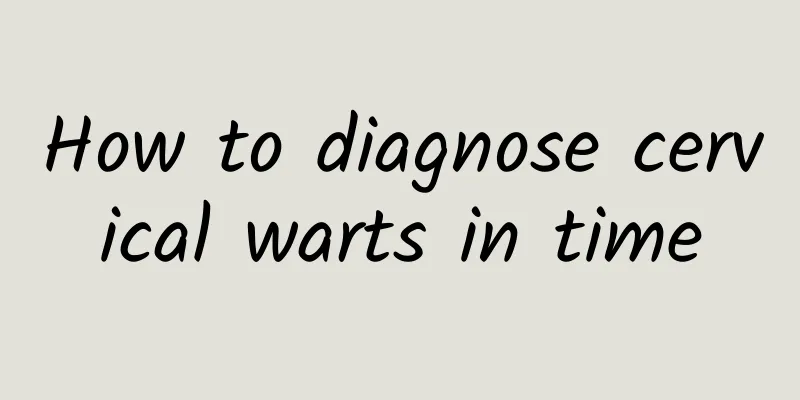What are the 3 signs of uterine fibroids? What are the symptoms of uterine fibroids?

|
Uterine fibroids are one of the most common benign tumors in women, and their incidence is higher in women of childbearing age. Uterine fibroids usually grow in the endometrium or uterine wall, and their symptoms vary depending on the size, location, and number of the tumor. Below we will take you to learn more about the symptoms of uterine fibroids and their three typical signs. 1. Symptoms of uterine fibroids Symptoms of uterine fibroids often vary depending on the size and location of the tumor. Some women may not experience any symptoms, while others may experience significant discomfort. 1. Abnormal menstruation The presence of uterine fibroids may cause menstrual abnormalities. This includes longer duration of menstruation, heavier menstrual flow, heavier bleeding between periods, and the occurrence of painful periods. Therefore, if you experience these changes in your menstrual period, especially if they are accompanied by the appearance of blood clots, you may have uterine fibroids. 2. Pelvic pain and pressure Uterine fibroids can also cause pelvic pain and pressure. When uterine fibroids grow larger and press on surrounding tissues, they may cause pain or pressure in the pelvic area. This pain may be accompanied by nausea, lower back pain, and other uncomfortable symptoms. 3. Frequent urination, constipation and abdominal pain If uterine fibroids grow near the bladder or intestines, frequent urination, constipation, and abdominal pain may also occur. Frequent urination and constipation are common symptoms due to the pressure of the tumor. 2. Three signs of uterine fibroids 1. Abnormal vaginal bleeding As one of the main symptoms of uterine fibroids, abnormal vaginal bleeding often manifests as irregular menstruation, dark red menstrual blood or blood clots, prolonged bleeding time, etc. 2. Abnormal abdominal palpation By palpating the abdomen, the doctor can feel that the uterus is enlarged or uneven. Fibroids may increase the size of the uterus and make the texture of the uterus uneven. These abnormal palpation findings usually indicate the presence of fibroids. 3. Abdominal pain and pressure Some patients may experience abdominal pain and pressure due to the compression of uterine fibroids on surrounding tissues. This pain may radiate from the waist to the abdomen, accompanied by a sense of pressure. Uterine fibroids may cause menstrual abnormalities, pelvic pain and pressure, frequent urination, constipation and abdominal distension and pain. The three typical signs include abnormal vaginal bleeding, abnormal abdominal palpation and abdominal pain and pressure. If you experience these symptoms, it is recommended to see a doctor in time and seek help from a professional doctor. Early detection, diagnosis and treatment are the key to preventing further development of uterine fibroids and alleviating symptoms. |
<<: Why do fibroids grow outside the uterus? What are fibroids that grow outside the uterus?
>>: What is uterine fibroid bleeding? What should I do if uterine fibroid bleeding occurs?
Recommend
How to care for pelvic inflammatory disease?
Pelvic inflammatory disease is a common gynecolog...
What are the complications of long-term chronic pelvic inflammatory disease?
Pelvic inflammatory disease is a common disease a...
4 things to note in daily life for patients with vulvar leukoplakia
Vulvar leukoplakia refers to a gynecological dise...
What are the specific causes of cervical hypertrophy?
Nowadays, many married women suffer from cervical...
Will drinking water make you fat? Are you a "puffy" person? Barley and winter melon seeds strengthen the spleen and remove dampness
Many obese people often complain that they actual...
Learn more about the key points of postoperative care for uterine fibroids
In order to make patients with uterine fibroids r...
What kind of porridge should I drink to replenish blood after getting uterine fibroids? What kind of soup should I drink after getting uterine fibroids?
What kind of porridge should I drink to replenish...
On the fifth day of abortion, I felt pain in my lower abdomen like dysmenorrhea.
On the fifth day after abortion, the lower abdomi...
A brief understanding of the causes of uterine fibroids
Uterine fibroids are the most common benign tumor...
What are the prevention methods of ovarian cysts?
It is very important for women to do a good job i...
What should I do if the left ovarian cyst ruptures and bleeds? Is it serious?
Ovarian cysts can affect women's menstruation...
Do women know what chronic cervicitis is? How long does it take to treat chronic cervicitis?
Chronic cervicitis has a great impact on women. I...
Let me introduce to you the advantages of common painless abortion
In order to minimize the harm caused by abortion,...
Why is it easy to gain weight when you eat to relieve stress? Nutritionist Hong Ruopu reveals: 10 stress-relieving foods to keep you away from obesity
Eat, eat, eat. Modern people are accustomed to us...
How to treat ovarian cysts with Chinese medicine
How does traditional Chinese medicine treat ovari...









